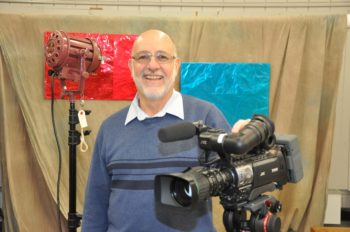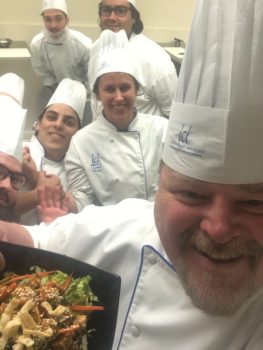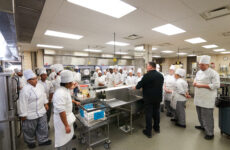By Chronicle Staff
Since the widespread outbreak of coronavirus, COVID-19, DMACC faculty have been working to find a solution to continue classes in an online setting.
Many classes are fairly straight-forward to transition online, but other programs can be a bit more difficult, especially those that require a more hands-on approach. The Chronicle staff reached out to some of these professors to gain insight on how DMACC has been transitioning online.

Steven Schott, Video Production Instructor
Steven Schott, Video Production:
DMACC’s Video Production Professor Steven Schott shared his experience with the transition online: “It went better than expected. Students might have participated more [than usual].”
Schott has one acting for camera course and three video production courses this semester that needed to transition online. With these being hands-on classes, both Schott and the students needed to be adaptable.
“Not everyone has proper software or a computer that can handle it,” Schott said. These students need the computers at DMACC that are now inaccessible due to the campus closure. Schott is having the students use what is available to them to continue practicing their craft.
When discussing the transition for his acting for camera class, Schott said, “We still have them acting on computer and cell phone cameras.” Students still follow the principles of good camera work that were being taught in class. For example, students took the script from “Frozen” and acted the characters out in Zoom, emulating the experience of an actor going to a studio.
DMACC’s video production classes usually integrate client work, which is impossible to complete due to the COVID-19 situation. Instead, students are recording daily video blogs in which they practice using skills like framing, lighting, and editing to produce.
“How we shoot and edit stories is constantly changing,” Schott said, “How do we use this time productively for when things do turn around. We see this as a shutdown, but it is really an opportunity.” Not just an opportunity for students and DMACC, but for the nation as a whole.
“What do we as a nation want to come out of this with?” Schott said, “What lessons will we get from this to bring back to society when this is over? Are we just going to go back to [how things were]?” There is good that can come from this, but time will tell if society embraces it.

Mathematics Professor Julie Hartzler.
Julie Hartzler, Math Professor:
DMACC Ankeny Math Professor Julie Hartzler talked about her experience transitioning to an online learning environment: “Overall, the biggest change is I don’t get to interact with my students the way I would like. The reason I went into teaching thirty years ago was because I wanted to help people learn mathematics and get to know them as individuals. It is hard to have those informal conversations that take place on campus, online.”
Additionally, Hartzler found that with the online transition, the hardest part was preparing mentally: “I think dealing with the shock of going fully online was the biggest hurdle. Mentally wrapping my brain around what that would mean for my four different classes was huge.”
Hartzler found that, in the transition, there were fewer challenges than she expected. “I thought how I teach would have to be a lot different. Surprisingly, using breakout groups has really allowed me to stay somewhat true to my teaching philosophy.” To this, Hartzler added that her technological knowledge allowed her to easily learn the needed skills to host an online class.
Hartzler teaches Math for Elementary Teachers I and II, both of which are hands-on-lab classes. Because of this challenge, Hartzler had to find ways to conduct a lab class online and has “managed to find a lot of virtual manipulatives, measurement tools, and apps to help students ‘see’ the mathematics.” Many lab-based classes across DMACC have had to make similar changes.
In these times, Hartzler believes that having a positive mindset is key. “I think that no matter what field you are in, change is inevitable. Learning how to learn is such an important skill. Change is going to happen, having an ‘I can’ mindset, even if there are obstacles, will serve people well.”

French Professor Maura Nelson
Maura G. Nelson, French Professor:
DMACC French Professor Maura G. Nelson commented on what it was like to transition from the classroom to a virtual classroom. She said that the transition has not been a challenge because for years she has been using Skype as a means of teaching.
There are many campuses that require her class, and holding a virtual class connects all of the students together. This has helped her gain the necessary experience for transitioning to an online class during this pandemic.
Unlike most teachers, who use Zoom to hold their class meetings, Nelson says, “I chose to go to Blackboard Collaborate, as it is part of Blackboard, which we already use as our classroom management system, so all my students are used to going into Blackboard to read announcements, get assignments, and submit homework there.” Therefore, making it easier for students to have everything in one place.
Nelson also found that her attendance has been fairly good since the epidemic. “Foreign language classes require a big-time commitment, so I’m pleased that most of my students are showing up to class.”
One thing that is missing, according to Nelson, is “the interactive component that a real online class wouldn’t provide.” In every foreign language class, a big component is the interaction and conversation that students practice in real life. When learning how to speak a language, one of the most helpful tips is practicing how to speak the language. Although you can practice online, personal interaction is always better.

Chef Mike Dell (foreground) poses with culinary arts students. Photo courtesy Chef Dell.
Chef Mike Dell, Culinary Arts:
Chef Mike Dell gives some insight as to what the culinary programs have been cooking up since DMACC’s online transition. Learning a new skill over the internet can be somewhat of a challenge, but Chef Dell has come up with some creative ways to teach his culinary students as best as he can.
Chef Dell teaches two Food Prep I classes and an International Cuisine Lab II course. Food Prep I is all about the basics. To continue teaching the students, Chef Dell has been recording his demonstrations, and having the students then walk through the steps in document form. This way, the students don’t have to stress about buying all of the groceries to make the dish or being able to record themselves if they aren’t able to.
“We had to find a way to make it even and fair for all students,” Dell explained.
International Cuisine Lab II is the course where the students do the gourmet dinners. The students have already completed three out of the four dinners for the semester. To replace the last meal that they cannot complete, Chef Dell has come up with an alternative solution. The recipe packets and menus for the final dinner were sent out to all of the students. With those they are meant to research the recipes online, and then extend them to work for 130 people. So they still get the practice, just without the actual cooking.
According to Dell, the majority of students have been thriving.
“I’ve been blown away. I’ve been completely overwhelmed with how positive they are,” explains Dell. Of course the students miss the camaraderie of being in class, but they are appreciative that they don’t have to miss out on learning.
A silver lining of this whole mess is that it prompted Chef Dell, as well as other chefs, to look into putting the program online. He explained how the culinary department has been thinking about a way to take this step for awhile now, and since their methods are working for the current situation, why not try it out?
“Nothing can replace tasting,” Dell explains. However, he is confident he can tell if something is cooked correctly just by looking at it. If anything, the more academic based culinary classes now have an opportunity to be taken online.
The Culinary program has taken every situation thus far with a grain of salt, but that’s not to say they aren’t sad.
“The human aspect of teaching is why we all teach,” says Dell.
He is hopeful that the chefs and students will be back in the kitchen as soon as possible, but for now, this is the way the cookie crumbles.





Comments